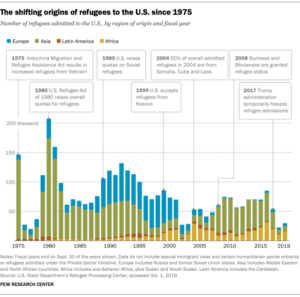Evangelicals are said to be the bedrock of Donald Trump’s political base.

Galen Carey
Perhaps, but many of them are decidedly not on board with his recent decision to cap the number of refugees resettled in the U.S. in 2020 at 18,000 – down from an already low 30,000 this year.
Galen Carey of the National Association of Evangelicals called the president’s decision “dramatic and heartbreaking.”
The pain includes the terrible consequences the decision will have on refugees around the globe, and from the fact they have become pawns in the nation’s toxic political situation, said Carey, vice president of government relations for the NAE.

“Until recently there has been very bipartisan support for refugees,” he told Baptist News Global. “Sadly, the issue gets caught up in some of our current polarized divides.”
Fluctuations in refugee limits are nothing new. Set by presidents annually, the ceiling hit 200,000 in 1980 followed by years of fluctuating caps usually above 50,000 and sometimes exceeding 100,000, according to figures compiled by the Pew Research Center.
One of the lowest points – about 27,000 –came a year after the Sept. 11 terror attacks, Pew reported.
But the political nature of the current reductions ignores the fact that refugees, and refugee care, unite Americans across partisan and religious boundaries, Carey said.
“This is an issue on which our (faith) leaders are quite united,” he said about NAE partners. “It’s something you see liberal and conservative churches being involved with.”
Carey spoke with BNG recently about the president’s decision and the impact it will have on refugees and the ministries that support them. His comments are presented here, edited for clarity.
The term “evangelical” seems up for grabs these days. How does NAE define it?
We have published a definition on our web site, but as a shorthand we say that an evangelical is someone who takes the Bible seriously and believes in Jesus Christ as savior and Lord.
What’s on your plate other than refugee resettlement?
We have eight areas of concern: religious freedom, protecting children and families, protecting the sanctity of human life, poverty, human rights, peace, racial justice and care of God’s creation.
Where does the refugee issue fit into those?
It’s part human rights, part of the sanctity for human life, poverty and peace. It usually involves all those, and religious freedom as well. Refugees are people who have to flee their homes and their countries because of persecution. U.S. and international refugee laws provide specific grounds for which people can claim refugee status. Among those are religious persecution, race, national origin, political opinion or membership in a social group.
How does this cut in refugee numbers run counter to religious freedom?
When people are persecuted because of their faith, sometimes they are martyrs and sometimes they are able to escape. And when they escape, they become refugees and they need places of safety to rebuild their lives. And when they can’t return to their countries because of a hostile government or fighting, then they need some place to go and the United States has historically provided a place of haven and refuge. Many are befriended by church and ministries groups.
Have you been in touch with the White House on this matter? What have you, or would you, say to the president?
We have met with administration officials, not with the directly with the president himself. What we have consistently said is welcoming refugees is a win-win for us, for the refugees and for the rule of law and religious freedom. We urge the president and administration to maintain the bipartisan support which we had consistently for decades. Republicans and Democrats have led a world-leading refugee resettlement program. We have done amazing things for them. It shows we are a country of compassionate people who care about human rights and protecting the sanctity of life.
Do you know if any of the high-profile ministers typically seen in White House photos are urging him to reconsider?
I certainly hope so. Our coalition that works on refugee issues includes the Ethics & Liberty Commission and a whole range of other organizations. We have sent (the president) a number of letters outlining our Christian convictions.
Can you envision the refugee quota being slashed to zero?
That would be tragic if it ever came to that. In the 30s we turned back boats full of Jewish refugees. We sent them back to Germany just in time for the Holocaust. We thought we had learned our lesson on that. But it looks like we are once again turning back refugees who are in need of our protection even though many organizations and communities are eager to receive them.
Do you think other countries will pick up our slack by upping their limits?
We have long been the world’s leader. Our good example has encouraged others to do more. When other countries see us doing less, it gives them license to say we don’t have to do this, either. The exception is Canada. Last year they resettled more refugees than we did. Hats off to the Canadians. But we ought to be ashamed that we have done so little.
What does scripture have to say about this issue?
You open the Bible and it’s full of refugees, most notably, of course, Jesus and Joseph and Mary, who had to flee into Egypt – and thank God the Egyptians received them and gave them refuge. You see God at work in refugee and exile situations and then we see Jesus saying “I was a stranger and you welcomed me.” It’s a common theme throughout the Bible about God’s care for the widow and the orphan and the alien because these are groups who are typically vulnerable. Refugees fit right in there.
Related story:
Ministries respond with grit, creativity to White House refugee cuts
